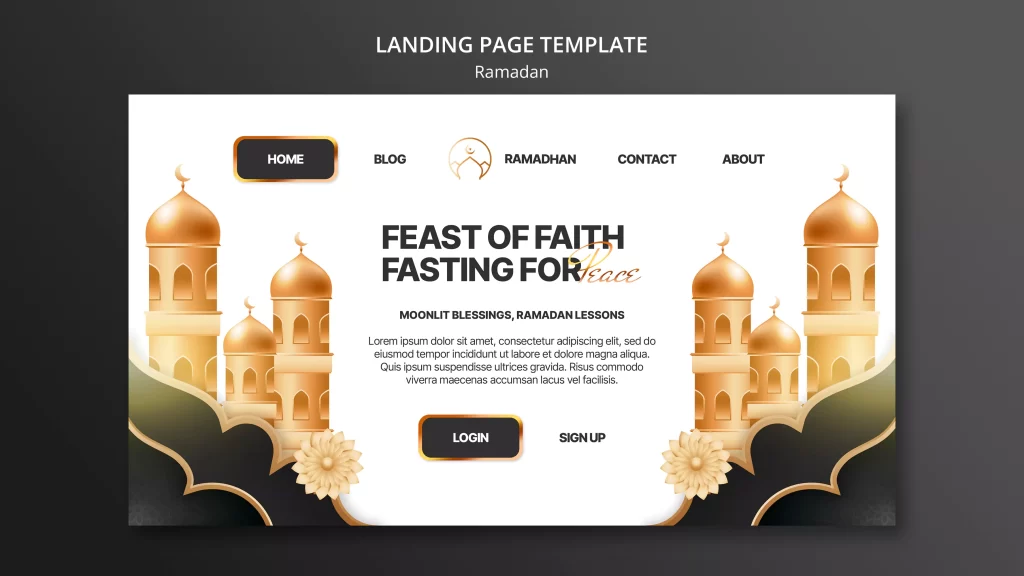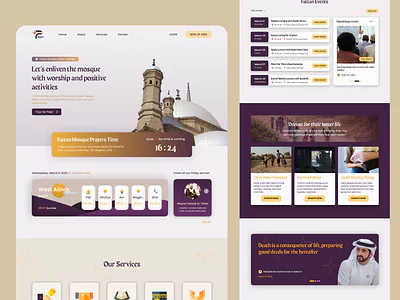In today’s digital world, a professional website is essential for any organization, including masjids. A well-designed website not only serves as a central hub for communication and community engagement but also plays a crucial role in fundraising and promoting the mosque’s activities. This article explores best practices for Websites for Masjids and offers examples to guide you in creating an effective online presence.
- The Importance of a Professional Website for Masjids
- Why a Website is Essential
- Best Practices for Website Design for Mosques
- User-Friendly Navigation
- Responsive Design
- Visual Appeal and Branding
- Content that Educates and Engages
- Search Engine Optimization (SEO)
- Incorporating Halal Digital Solutions and Marketing
- Halal Digital Solutions
- Ethical Fundraising Practices
- Effective Fundraising Ideas Through Websites
- Online Donation Platforms
- Crowdfunding Campaigns
- Promoting Fundraising Events
- Examples of Successful Masjid Websites
- Conclusion:
The Importance of a Professional Website for Masjids
A professional website for a masjid is more than just an online brochure; it’s a platform that connects the community, provides essential information, and supports the mosque’s mission. With the growing reliance on digital communication, having a robust online presence is critical for non-profit organizations like mosques.
Why a Website is Essential
A website is essential for a masjid because it offers a centralized location where members and visitors can find information about prayer times, upcoming events, community services, and more. It also serves as a tool for fundraising, enabling the mosque to collect donations online, which is increasingly important in the digital age.
A well-designed website for mosques can also enhance halal marketing efforts by providing a platform to share content that aligns with Islamic principles. This ensures that all promotional activities are conducted ethically and respectfully, which is vital for maintaining trust within the community.
Best Practices for Website Design for Mosques
When designing a Websites for Masjids, certain best practices should be followed to ensure that the site is user-friendly, informative, and aligned with the mosque’s values and mission.
User-Friendly Navigation
One of the most important aspects of website design for mosques is user-friendly navigation. Visitors should be able to easily find the information they need, whether it’s prayer times, event details, or donation options. A clear and simple menu structure, with well-organized sections, helps users navigate the site efficiently.

Responsive Design
With the increasing use of mobile devices, it’s essential that the website is fully responsive. This means that the site should look and function well on all devices, including smartphones, tablets, and desktops. A responsive website design for masjids ensures that the user experience is consistent and positive, regardless of how visitors access the site.
Visual Appeal and Branding
The visual design of a website plays a significant role in making a positive first impression. Using appropriate colors, fonts, and imagery that reflect the mosque’s identity is crucial. Incorporating Islamic art or design elements can enhance the site’s appeal and reinforce the mosque’s cultural and religious significance.
Content that Educates and Engages
The content on the website should be educational, engaging, and relevant to the mosque’s community. This includes regular updates on events, classes, and other activities. Providing resources like articles, videos, and downloadable materials can also help educate visitors about Islamic teachings and the mosque’s role in the community.
Search Engine Optimization (SEO)
To reach a broader audience, it’s important to optimize the website for search engines. This involves using relevant keywords, such as Websites for Masjids, in titles, headers, and throughout the content. SEO practices help ensure that the mosque’s website appears in search results when people look for related information online.
Incorporating Halal Digital Solutions and Marketing
Incorporating halal digital solutions and halal marketing strategies into the website design is crucial for maintaining the integrity and values of the mosque. This involves ensuring that all online activities, from fundraising to content sharing, align with Islamic principles.
Halal Digital Solutions
Halal digital solutions refer to the use of technology and online tools in a way that complies with Islamic law. For mosques, this means ensuring that all online interactions, whether financial transactions or content dissemination, adhere to ethical and religious guidelines. Using platforms and tools that support halal marketing is key to maintaining the trust and confidence of the community.
Ethical Fundraising Practices
Fundraising is a critical function of a websites for Masjids. To ensure that fundraising efforts are effective and ethical, it’s important to provide clear information about how donations will be used and to offer secure, transparent methods for contributing. Highlighting the impact of donations through success stories and updates can also encourage more community members to contribute.
Effective Fundraising Ideas Through Websites
A well-designed website can significantly boost the effectiveness of fundraising for mosques. Here are some strategies to consider:
Online Donation Platforms
Incorporating online donation platforms into the website makes it easy for community members to contribute financially. These platforms should be secure, user-friendly, and provide options for one-time or recurring donations. Integrating these platforms with social media can also expand the reach of fundraising campaigns.
Crowdfunding Campaigns
Crowdfunding is another powerful fundraising tool that can be effectively utilized through the mosque’s website. Creating specific campaigns for projects, such as renovations or community outreach programs, and promoting them through the website can attract broader support. Crowdfunding also allows donors to see the collective impact of their contributions, which can be highly motivating.
Promoting Fundraising Events
The website should be used to promote all fundraising events, providing details about the purpose, date, time, and how to participate. Offering online registration and ticket sales can streamline the process and increase participation. Additionally, showcasing past events with photos and testimonials can help build excitement for future activities.
Examples of Successful Masjid Websites
To inspire your website design for mosques, it’s helpful to look at examples of successful masjid websites that effectively engage their communities and support their missions.

Example 1: The East London Mosque
The East London websites for Masjids is an excellent example of a professional and well-organized site. It features easy navigation, regularly updated content, and integrated online donation options. The site also includes a detailed section on community services, showcasing the mosque’s commitment to serving its members.
Example 2: Islamic Center of Irvine
The Islamic Center of Irvine’s website is another great example. It offers a responsive design, clear branding, and a wealth of resources, including videos, articles, and event updates. The site’s integration of social media feeds and live streaming options enhances its connectivity with the community.
Example 3: Masjid al-Haram
As one of the most significant mosques in the world, Masjid al-Haram’s website is a model of excellence. It combines traditional Islamic aesthetics with modern web design principles, offering a seamless user experience. The site provides extensive information, from prayer schedules to educational programs, all presented in a visually appealing and accessible format.
Conclusion:
Best Practices Lead to Effective websites for Masjids Creating a professional website for a masjid involves more than just attractive design; it requires thoughtful planning, ethical considerations, and a focus on community engagement. By following best practices in website design for mosques, incorporating halal digital solutions, and using the site as a platform for fundraising and communication, mosques can build strong, supportive online communities.



